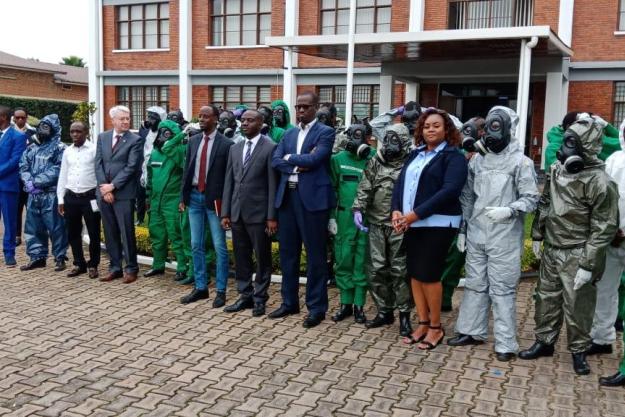
THE HAGUE, Netherlands – 11 March 2020 — Rwanda’s airport, border and police personnel further expanded their skills in managing chemical emergencies at a National Basic Training Course on assistance and protection, held in Kigali, Rwanda from 2 to 6 March. The training was jointly organised by the Organisation for the Prohibition of Chemical Weapons (OPCW), and the Rwanda Directorate General of Immigration and Emigration.
The twenty-two participants were provided with the basic knowledge, skills and abilities to conduct necessary operations in the aftermath of a chemical weapon attack or in the event of an incident involving toxic chemicals. The course also included the use of individual and collective protective equipment, monitoring, detection, and decontamination equipment and techniques as well as sampling and analysis in contaminated areas.

It was delivered by OPCW experts and a team of East Africa Community (EAC) instructors from Kenya and Tanzania under the Development and Exchange of Instructors Programme of OPCW Technical Secretariat.
In his opening remarks, the Director General of the Rwanda Directorate General of Immigration and Emigration, Lt Col Francois-Regis Gatarayiha emphasised the commitment of Rwanda to the implementation of the Chemical Weapons Convention and welcomed the knowledge and skills gained that would contribute to strengthening national preparedness to counter chemical attacks.
OPCW Programme Officer Mr Babatunde Olowookere underlined that such trainings are “important in building reliable national and regional capacities to protect citizens during chemical emergencies”.
Background
The course supports the implementation of Article X of the Chemical Weapons Convention (CWC), which concerns assistance and protection against chemical weapons.
The training-of-trainers approach helps ensure sustainable and efficient use of OPCW resources for capacity building. This course is part of the Organisation’s Instructor Development and Exchange Programme focusing on building and exchanging knowledge, skills and protocols in the area of assistance and protection.
As the implementing body for the Chemical Weapons Convention, the OPCW, with its 193 Member States, oversees the global endeavour to permanently eliminate chemical weapons. Since the Convention’s entry into force in 1997, it is the most successful disarmament treaty eliminating an entire class of weapons of mass destruction.
Over 97% of all chemical weapon stockpiles declared by possessor States have been destroyed under OPCW verification. For its extensive efforts in eliminating chemical weapons, the OPCW received the 2013 Nobel Peace Prize.
